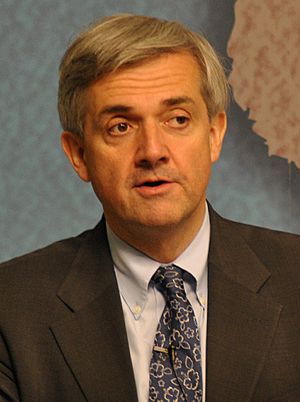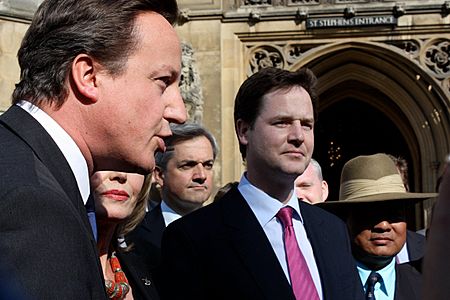Chris Huhne facts for kids
Quick facts for kids
Chris Huhne
|
|||||||||||||||||||||||||||||||||||
|---|---|---|---|---|---|---|---|---|---|---|---|---|---|---|---|---|---|---|---|---|---|---|---|---|---|---|---|---|---|---|---|---|---|---|---|

Huhne in 2011
|
|||||||||||||||||||||||||||||||||||
| Secretary of State for Energy and Climate Change | |||||||||||||||||||||||||||||||||||
| In office 12 May 2010 – 3 February 2012 |
|||||||||||||||||||||||||||||||||||
| Prime Minister | David Cameron | ||||||||||||||||||||||||||||||||||
| Preceded by | Ed Miliband | ||||||||||||||||||||||||||||||||||
| Succeeded by | Ed Davey | ||||||||||||||||||||||||||||||||||
|
|||||||||||||||||||||||||||||||||||
| Member of Parliament for Eastleigh |
|||||||||||||||||||||||||||||||||||
| In office 5 May 2005 – 5 February 2013 |
|||||||||||||||||||||||||||||||||||
| Preceded by | David Chidgey | ||||||||||||||||||||||||||||||||||
| Succeeded by | Mike Thornton | ||||||||||||||||||||||||||||||||||
| Member of the European Parliament for South East England |
|||||||||||||||||||||||||||||||||||
| In office 10 June 1999 – 12 May 2005 |
|||||||||||||||||||||||||||||||||||
| Preceded by | Constituency established | ||||||||||||||||||||||||||||||||||
| Succeeded by | Sharon Bowles | ||||||||||||||||||||||||||||||||||
| Personal details | |||||||||||||||||||||||||||||||||||
| Born |
Christopher Murray Paul-Huhne
2 July 1954 London, England |
||||||||||||||||||||||||||||||||||
| Political party | Labour Party (before 1981) Social Democratic Party (1981–1988) Liberal Democrats (1988–2013) Independent (since 2013) |
||||||||||||||||||||||||||||||||||
| Spouse |
Vicky Pryce
(m. 1984; div. 2011) |
||||||||||||||||||||||||||||||||||
| Domestic partner | Carina Trimingham (2010–present) | ||||||||||||||||||||||||||||||||||
| Children | 3 | ||||||||||||||||||||||||||||||||||
| Alma mater | Magdalen College, Oxford | ||||||||||||||||||||||||||||||||||
Christopher Murray Paul Huhne (born 2 July 1954) is a British consultant on energy and climate change. He is a former politician who was a Liberal Democrat Member of Parliament (MP) for Eastleigh from 2005 to 2013.
From 2010 to 2012, he served as the Secretary of State for Energy and Climate Change. This is a senior role in the UK government, responsible for the country's energy supply and policies on climate change. Before becoming a politician, he worked as a journalist and an economist.
His political career ended in 2013. Today, he advises companies on renewable energy, which is energy from natural sources like the wind and sun. He is especially interested in technologies that can provide power when the sun isn't shining or the wind isn't blowing.
Contents
Early Life and Education
Chris Huhne was born in west London. His father, Peter, was a businessman, and his mother, Ann, was an actress. He went to Westminster School, a famous school in London.
After finishing school, he studied at Magdalen College, Oxford. There, he earned a top-class degree in Philosophy, Politics, and Economics (PPE). He was also interested in student politics and supported the Labour Party at the time.
Career Before Politics
Before entering politics, Huhne had a successful career as a journalist. He worked for famous newspapers like The Economist, The Guardian, and The Independent. He won awards for his writing about finance and economics.
Later, he started his own company in the City of London. His company advised on the financial risks of investing in different countries. This business became part of Fitch Ratings, one of the world's largest rating agencies.
Political Career
Huhne first tried to become an MP in 1983 and 1987 but was not elected. He continued to work towards a career in politics.
Member of the European Parliament
In 1999, Huhne was elected as a Member of the European Parliament (MEP) for South East England. The European Parliament helps make laws for the European Union. As an MEP, he focused on economic and financial issues. He was known for being one of the UK's most high-profile MEPs.
He was re-elected in 2004 but left in 2005 after he was elected to the UK Parliament.
Member of Parliament for Eastleigh
In the 2005 general election, Huhne was elected as the MP for Eastleigh, a town in Hampshire. An MP's job is to represent the people of their local area, called a constituency, in the House of Commons.
As an MP, he became the Liberal Democrats' spokesperson for the Treasury. This meant he was responsible for speaking about the party's ideas on the economy and government spending.
Running for Party Leader
Huhne twice ran to become the leader of the Liberal Democrats. The leader is the most important person in a political party.
In 2006, he came in second place to Sir Menzies Campbell. During his campaign, he argued for more "green taxes" on pollution to help the environment.
In 2007, he ran again and very narrowly lost to Nick Clegg. After this, Clegg appointed Huhne as the party's Home Affairs Spokesman. This role involved speaking about issues like policing and national security.
Working in Government
After the 2010 general election, no single party won enough votes to govern alone. The Conservatives and Liberal Democrats agreed to work together in a coalition government.
Huhne was part of the team that negotiated this agreement. He was then appointed as the Secretary of State for Energy and Climate Change. In this important job, he worked to make the UK more environmentally friendly. He supported renewable energy sources like wind power and even put a small wind turbine at his own home.
Leaving Politics
On 3 February 2012, Huhne resigned from his government job. In February 2013, he admitted to breaking the law in relation to a speeding offence that happened many years earlier.
Because of this, he resigned as a Member of Parliament and left politics. He was the first Liberal Democrat MP to resign from Parliament since 1941.
Life After Politics
Since leaving Parliament, Huhne has worked as a consultant and adviser on energy and climate change. He uses his knowledge to help companies that work with renewable energy, such as biogas (gas made from waste) and biomass (fuel from organic materials).
He has worked with Zilkha Biomass Energy, a company that makes fuel pellets from wood chips. He is also the chair of the Anaerobic Digestion & Bioresources Association (ADBA), which represents the UK's biogas industry.
Personal Life
In 1984, Huhne married Vicky Pryce, an economist. They have three children together. The couple separated in 2010 and later divorced. Huhne's current partner is Carina Trimingham.
His interests include economics, European politics, and electoral reform, which is the study of how to make voting systems fairer.
See also
- Jonathan Aitken – Conservative politician imprisoned for perjury
- Jeffrey Archer – Conservative politician also imprisoned for perjury
- Marcus Einfeld - Australian judge also convicted of perverting the course of justice over a speeding case
 | Delilah Pierce |
 | Gordon Parks |
 | Augusta Savage |
 | Charles Ethan Porter |


